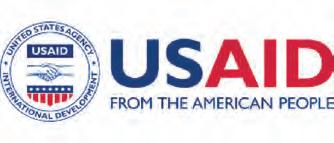
15 minute read
Community Matters
USAID Muslim Employees Seek Harmony Among People
In the aftermath of race riots, USAID’s (https://www.usaid.gov) Muslim American staff issued a statement that as federal workers, they strive to uphold the values embodied in both the nation’s founding documents and Islam’s tenets that we are all children of Adam who God has honored in our humanity (17:70). “It is therefore our affirmative obligation as citizens, Muslims, and public servants to always enjoin what is right, forbid what is wrong, and uphold the highest ethical standards,” they declared.
Advertisement
The Muslim Americans made by this group, as well as the Employee Resource Groups at USAID, summarizes their common commitment to the sanctity of all life and specifically affirmed that “Black Lives Matter.”
The Muslim American employees cited 5:32: “... whoever takes a life—unless as a punishment for murder or mischief in the land—it will be as if they killed all of humanity; and whoever saves a life, it will be as if they saved all of humanity.”
They also cited “Musnad Ahmad,” hadith no. 22978, which states that the only things that set people apart is their righteousness and good actions. In other words, ethnicity and skin color are irrelevant.
The most famous African Companion was Bilal (radiy Allahu ‘anhu). Although he wasn’t the only one, we should be aware of the following similarity: George Floyd died under the knee of a White officer, whereas Bilal survived the violence inflicted on him by his Arab owner Umayyah ibn Khalaf. He had Bilal laid out spread-eagled on the hot desert sand, whipped and beaten, and then ordered a hot boulder placed on his chest, all in an attempt to “convince” his slave to renounce Islam. Bilal refused.
As Muslims, we reaffirm the sanctity of all life and proudly proclaim: “Black Lives Matter.” Just as the Prophet proclaimed equality and denounced racism, we pray that one day all Americans will come together in peace, dignity and respect. ih
Zaid Shakir Agrees to Lead MANA
Imam Zaid Shakir has agreed to become the new leader of the Muslim Alliance in North America (MANA).
Zaid Shakir, an internationally recognized Islamic speaker and educator and one of MANA’s original founding members, is also the co-founder of Zaytuna College, in Berkley, Calif. He accepted the invitation of Imam Siraj Wahhaj, MANA's founding and long-time leader, to succeed him. MANA's board concurred.
Speaking of MANA’s important historical significance, he said, “MANA is a great trust -- it is intricately connected to the history of many great pioneers whose tireless efforts and sacrifices have led to the African American community being the only indigenous community in the Western world to have a trans-generational Muslim presence. Such a communal engagement, argues Dr. Sherman Jackson, affords a degree of invaluable legitimacy to Muslims in America, especially those of African descent. If we do not build on that legitimacy it could well be lost and once lost it can never be regained. Such a loss would have deep implications for American Muslims.” The Center for Islam in the Contemporary World at Shenandoah University (CICW) and the Muslim Student Life at Syracuse University (MSL) conducted a survey (https://www.contemporaryislam. org/covid-survey.html) to understand the impact of the COVID-19 pandemic on Muslim students in higher education in the U.S. It found that the majority of them have no confidence in the federal government and the president to effectively respond to their pandemic-related needs. In contrast, they have far more confidence in state government and their school, while the majority has confidence in their local mosques, national Islamic institutions, their school’s Muslim chaplain and the MSA.
The survey leveraged and adjusted some Imam Zaid sees MANA as an historic organization whose flourishing benefits not only Muslim African Americans, but also a ll Muslims in the U.S. He plans to draw on the entire Muslim American community’s resources to ensure that MANA flourishes, because, “MANA’s success is our collective success — our beloved Prophet (salla Allahu ‘alayhi wa sallam) said, ‘believers are unto each other like the individual bricks in a wall, each one strengthens and supports the next.’ We all need and must support one another, if our community is to be that strong wall” (“Sahih al-Bukhari,” hadith no. 481).
Imam Zaid especially thanked all of those who have worked to establish MANA and to keep it viable for almost two decades. Besides taking on a new role with MANA, he continues to work with Zaytuna College and hopes that the two institutions can work together to help produce future leaders for our community.
We pray for God’s blessing and guidance upon Imam Zaid in his new role of leader of MANA and look forward to seeing positive
fruits emerge from his leadership. ih

of the questions from previous and ongoing data collection efforts conducted by the Institute for Social Policy and Understanding, Student Veterans of America and the Bob Woodruff Foundation.
Conducted from March 30 through April 10, 2020, 498 students from 32 states
completed the survey. The researchers asked 100+ MSAs in 42 states to help disseminate the survey. It was also shared through the Association of Muslim Chaplains (AMC), Hartford Seminary, the National Association of Campus and University Chaplains (NACUC) and the Association for College and University Religious Affairs (ACURA). The resulting data show an overall increase in religious practice as well as higher levels of stress, anxiety and depression.
The Muhammad Ali Center (https://alicenter.org) reopened to the public on July 1 after closing on March 14 due to the coronavirus pandemic.
Located between historic Main Street and the Ohio River in downtown Louisville, Ky., the architecturally captivating Muhammad Ali Center offers beautiful river views, modern design, built-in audio/visual capabilities, outdoor spaces and urban appeal, as well as on-site programs, private events, group tours, student tours, a retail store and 2-1/2 levels of award-winning exhibits.
Until further notice, the hours of operation will be Wednesdays-Sundays, 12:00 noon to 5:00 p.m. Obtain admissiontickets at: https://19291. blackbaudhosting.com/19291/tickets?tab=3&txobjid=c5802200-0fd1- 47f0-b7c8-2f5c05e2b2b8. ih

Daily prayers, fasting, dhikr and optional prayers are sometimes approached routinely, without any deep understanding of or engagement with their higher and holistic objectives. This reality limits their effects and benefits on overall well-being.
Given that Muslim students trust their local mosque and Muslim chaplain, institutions have been asked to connect with their local Islamic institutions to learn how to serve their Muslim students better. Schools without a Muslim chaplain should consider hiring one; schools that have one should reach out and decide how to best serve and assist Muslim students during this pandemic.
The survey recommended that Muslim students should work with their local Islamic institution(s), Muslim chaplain and health/ wellness center to reduce any feelings of anxiety, stress and depression. Instead of just publicizing these services, counselors and chaplains should reach out to them. Counselors and wellness centers must familiarize themselves with these students’ potential specific needs and coping strategies.
As the lack of health insurance could be another cause of anxiety, schools should
The Alija Izetbegović Foundation (https://www. alijaizetbegovic.org), which commenced its work in Sarajevo, Bosnia and Herzegovina (B&H), will strive on its own and with other organizations to implement social initiatives and cultural programs in accordance with the view and intellectual legacy of Alija Izetbegović, the republic’s first president (1990-96). The nonprofit and nonpartisan foundation seeks to contribute to the republic’s progress and well-being of its people and citizens on the principles of freedom, equality, plurality and respect for diversity; connecting and promoting the intellectual potential of B&H society; and developing awareness of the importance of peace, nonviolence and social solidarity.
In addition, it will foster personal development, social entrepreneurship, a scientific approach to societal issues and build ties with the diaspora. In particular, it seeks to contribute to the Bosniaks’ self-cognition and understanding of themselves as an indigenous European Muslim people, building on the objective evaluation and promotion of President Izetbegović’s intellectual legacy as a European Muslim thinker.
Due to Covid-19-related circumstances, however, uncertainty exists as to when the foundation’s activities planned for this year — a workshop and summer school, forums and roundtables, an international conference and others — will be implemented.
The founders are close associates, family members and supporters of Izetbegović’s work. The board members are Dr. Hilmo Neimarlija (president; member, General Assembly), Sabina Izetbegović Berberovic (former head of the cabinet under President Izetbegović), Muzaffer Cilek (founding chairman, Strawberry Foundation; member, General Assembly), Fikret Karcic (professor, Faculty of Law, University of Sarajevo), Zijad Ljevakovic (director, the Gazi Husrev-beg Medresa), Fikret Muslimovic (retired general; national security advisor) and Faris Nanic (former advisor to the late president).
You can follow its work and activities on Facebook — https://www.facebook.com/ fondacija.alijaizetbegovic and Twitter — https://twitter.com/alijafoundation. Media contact: info@alijaizetbegovi.org. ih
consider providing it for up to a year after graduation.
The report recommended that schools track the number of Muslim students; encourage them to self-identify and ask about their needs both during and after the pandemic (i.e., the need for a Muslim chaplain, a place to pray and access to halal food). They should ensure that these students achieve their academic goals and have meaningful internship and job opportunities.
It also recommended that Muslim students work with their institution of higher education and its health/wellness center, and that the latter should communicate via email at least once a week; offer video chats, live discussion and counseling sessions and provide support and encouragement.
Muslim students should ask their institutions to train their wellness and mental health counselors on proper interactions, competencies, coping strategies and needs related to their beliefs and practices. For example, a Muslim chaplain can provide cultural competency training for anyone who works directly with Muslim students.
Dr. Mirza Tihić of Syracuse University helped design, administer and interpret the survey’s data.
Dr. Nina Ahmad won the hotly contested, six-way Democratic primary for Pennsylvania auditor general, leading her closest competitor by more than 70,000 votes.
Dr. Ahmad, a molecular biologist and entrepreneur who served as deputy mayor of Philadelphia, is a former president of the Philly National Organization for Women. She also served

TOLEDO POLICE OFFICER ANTHONY DIA, 26, a Muslim who enlisted two years ago, and was shot and killed by a drunk man on July 4 in a Home Depot parking lot. On July 7, he was laid to rest with full honors. Family members and a sea of police officers attended from departments across Ohio and Michigan.
“My son died a hero, and if he was ever given a choice, ‘Hey, do you want to die in bed sick, do you want to die in a car accident or do you want to die like this, a martyr,’ Anthony would choose this box 100%. He wouldn’t want to go out any other way,” his father Tony told a press conference.
“He was a great father, a great husband, a great brother, a great friend and just such a great human being overall,” his cousin Moustafa Rahal said. “I didn’t have many friends in high school, but Anthony always tried his best and included me in everything. He always treated me as a brother.”
Anthony is survived by his wife Jayme and two sons.
Mayor Wade Kapszukiewicz, added:
“The Dia family has lost a son and a husband and a father, but it has gained 600 brothers and sisters — the police family here in Toledo. I might suggest that the
Dia family has gained several hundred thousand more because Toledo is a family.” ih on President Barack Obama’s National Advisory Commission on Asian Americans and Pacific Islanders. Sufia Azmat, executive director of The Council of Islamic Schools in North America (CISNA; https://www.cisnausa. org), announced its advisory council members on June 25.
Shaikh Abdalla Idris Ali (executive director, ISNA Canada) is a founder and senior advisor of CISNA who also served as ISNA president (1992-97). As principle of the ISNA Canada Islamic School for over a decade, he was integral in implementing Islamic and Arab studies syllabuses for elementary and junior high students. He is currently a Board of Trustees member for the Islamic Teaching Center and North American Islamic Trust.
Necva Ozgur is founder and executive director of Muslim Educators, Resource, Information and Training Center (MERIT; http://www.meritcenter.org), as well as founding head of New Horizon School Pasadena and Bayan Islamic Graduate School in California
Ahmed ElHattab, director of development at Sterling Charitable Gift Fund, was formerly executive director of ISNA Development Foundation, ISNA’s interim secretary general for several years and president of the Muslim Arab Youth Association (1986-87). Since 2012 he has been a board member of the American Islamic College in Chicago (AIC; https:// aicusa.edu).
Shahéd Said Khan’s career extends over almost three decades and includes operating a global family-owned business. He has been involved in many cross-industrial manufacturing and service sector ventures in the U.S. He believes strongly that helping Islamic schools in the U.S. is vital.
The new Waukee Islamic Center, located in a suburb of Des Moines, Iowa, received city approval for its 5,500-squarefoot single-story building, reported the Des Moines Register on June 16.
The city’s first stand-alone mosque will accommodate Waukee’s Muslims. Masjid Sahabah, which has rented office space since 2013, had become too small to accommodate the growing community. The new center will
have 50 parking spaces.
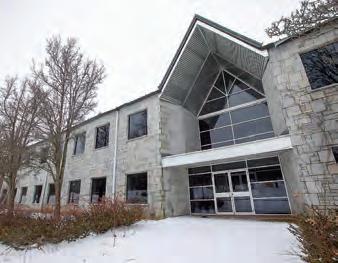
The Meriden (Conn.) city council has agreed to pay up to $45,000 to settle a federal lawsuit filed last year by the Omar Islamic Center, reported The Record-Journal on June 17. The planning commission denied the center’s application to relocate to a long-vacant two-story building in March 2019.
In this zone, property owners are allowed to obtain special exceptions for such uses as a school or a house of worship. The lawsuit had argued the commission “created a reason for denial that no place of worship could surmount,” adding that “the stated reasons (for the denial) are therefore in bad faith and evidence of the discriminatory intent of the commission...”
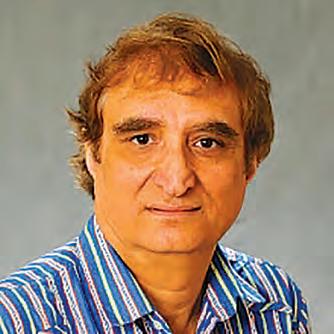
District of Columbia Center for AIDS Research (DCFAR) investigator Dr. Imtiaz Ahmed Khan, professor of microbiology, immunology and tropical medicine, School of Medicine and Health Services, The George Washington University, was awarded a Research Project Grant (R01). This original and historically oldest grant mechanism, used by the National Institutes of Health (NIH) to support for health-related research and development based on it mission, comes from NIH’s National Institute of Allergy and Infectious Diseases (NIAID) and is entitled, "CD4 Dysfunction and Cerebral Toxoplasmosis."
The project aims to study the factors that contribute to protective immunity against Toxoplasma gondii and evaluate changes in CD4 Central Memory T cells (TCM) during latent toxoplasmosis.
Dr. Khan received his doctorate from the Institute of Medical Sciences at Banaras Hindu University, India, in 1983. He then worked as a senior resident in the Department of Clinical Microbiology at the Kashmir Institute of Medical Sciences and Technology, Srinagar, (Indian-occupied) Kashmir. In 1986 he moved to the U.S. and joined the Dartmouth Medical School in New Hampshire as a postdoctoral fellow. ih

ACHIEVERS

Dr. Javida Rizvon, MD, who has a 20+ year practice, was appointed medical director at the A. Holly Patterson Extended Care Facility (AHP) on June 26.
One of New York state’ largest nursing homes, AHP is recognized nationally as a model for skilled nursing facilities, which offers innovative care in an environment that treats the “whole” person.
Dr. Rizvon, a graduate of India’s Madras Medical College, completed her residency training in internal medicine at Nassau County Medical Center. A certified HIV specialist, she has extensive experience in primary care, hospital medicine and care of the elderly.
Her teaching roles include geriatric education of internal medicine and family medicine residents from Nassau University Medical Center and Hofstra University’s physician assistant students. The winner of multiple awards for outstanding patient care, her special interests include long-term ventilator, wound care and HIV management of the elderly.
In addition to being board certified in internal medicine, she is also a member of the American Medical Directors Association. Yousef Saleh, a first-generation American born and raised in Jersey City’s Dr. Muhammad Shafiq, Ph.D., was appointed co-chair of Monroe County’s (N.Y.) 21-member Commission on Racial and Structural Equity (RASE) on June 18. He is professor and executive director, Hickey Center for Interfaith Studies and Dialogue and IIIT Interfaith Studies Chair at Nazareth College.
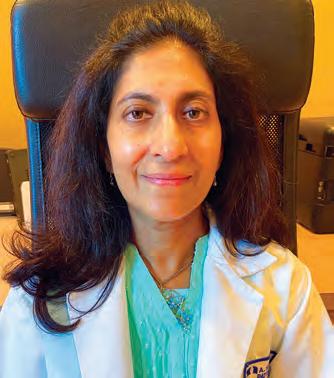
Co-chair and former Rochester mayor William Johnson emphasized that every institution in the county needs to be evaluated for structural change. But simply addressing what issues are at play will likely not be enough to spur any sort of substantial impact.
Shafiq appreciated that the board is representative of the community at large and is poised to examine every nuance of systemic inequality
Rochester mayor Lovely Warren and Monroe County executive Adam Bello said the commission will examine and develop recommendations around policies and legislation in areas such as education, health care, job creation, business development and social services. It will submit its report and recommendations for structural changes in the public and private sectors within six
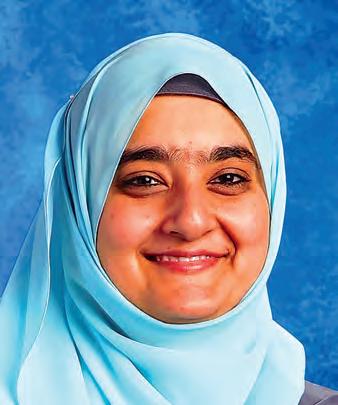
months. The National Association of Elementary School Principals (NAESP) recognized Dr. Iram Shaikh-Jilani, head of school of Brighter Horizons Academy College Preparatory, Garland, Texas, as a National Distinguished Principal.
Shaikh-Jilani, who was nominated by the Council of Islamic Schools in North America, is the second Islamic school principal and first Muslimah to receive this award. This award recognizes outstanding elementary and middle-level administrators for setting high standards for instruction, student achievement, character and climate for students, families and staff in their learning communities.
Last year’s awardees included Habeeb M. Quadri (principal, the Muslim Community Center Academy, Morton Grove, Ill.), who is on the principal advisory board, a part-time staffer at the Harvard Graduate School of Education’s Principal Center and the founder of High Quality Educational Consulting.
Iram will be honored at an awards banquet in Washington D.C., during October. CISNA has been invited to attend this gala.

Upon his appointment on July 6, Capt. Adeel S. Rana became the first Pakistani-American to serve as a commanding officer of New York Police Department’s 84th Precinct.
Rana, who was promoted to captain during September 2018, is president of the NYPD Muslim Officers Society — the nation’s first fraternal organization representing Muslim American law enforcement officers.
Rana, a military veteran, has served as an NYPD officer for 15 years. The precinct includes Brooklyn Heights, Boerum Hill, Vinegar Hill and the Farragut Residences in Brooklyn. ih








